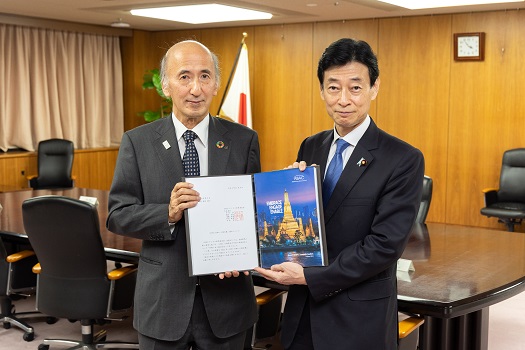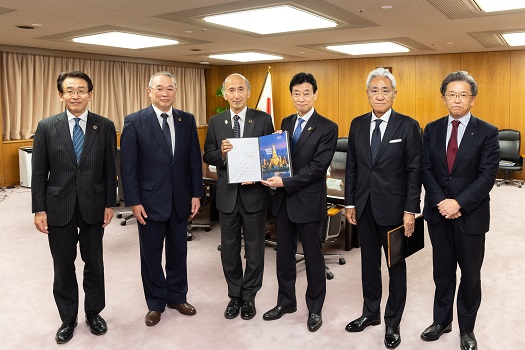- Home
- News Releases
- Back Issues
- November FY2022
- Prime Minister Kishida Receives the ABAC 2022 Report to APEC Economic Leaders
Prime Minister Kishida Receives the ABAC 2022 Report to APEC Economic Leaders
November 10, 2022
Yesterday, the Japanese members of the APEC Business Advisory Council (ABAC) visited Japanese Prime Minister Kishida Fumio and Minister of Economy, Trade and Industry Nishimura Yasutoshi and directly handed each of them the “ABAC 2022 Report to APEC Economic Leaders.” The Ministry of Economy, Trade and Industry (METI) will make further efforts regarding the issues highlighted in the report.
ABAC is APEC's official private-sector advisory entity, established in 1996. Representing business sectors in the Asia-Pacific region, it annually releases the ABAC Report to APEC Economic Leaders. ABAC members consist of representatives of the business sectors of 21 APEC member economies and are appointed by respective leaders. From Japan, three members and two alternate members are appointed by the prime minister.
On November 9, 2022, the Japanese members of ABAC visited Prime Minister Kishida and METI Minister Nishimura and directly handed each of them the ABAC 2022 Report.
Key points of the ABAC 2022 report (see the Appendix to the ABAC Japan press release below for details)
- Regional economic integration (e.g., promotion of the Free Trade Area of the Asia-Pacific [FTAAP] concept, advocacy of a multilateral trading system based on the support and rules of the World Trade Organization [WTO], and strengthening of trade in services)
- Digital (e.g., expansion of physical infrastructures essential to promoting digitalization, cybersecurity, expansion of digital IDs and other fundamental digital infrastructures)
- Inclusiveness of MSMEs (e.g., strengthening of sustainable practices for MSMEs, promotion of digital transformation for MSMEs)
- Sustainability (e.g., building of sustainable and resilient food systems, promotion of effective measures against climate change, promotion of energy transformations toward a low-carbon economy)
- Finance and economy (e.g., implementation of monetary and fiscal policy, fiscal reconstruction through new fiscal methods and government spending for structural reform)

